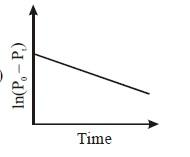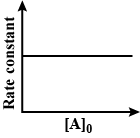Question
Question: For a first order reaction \(A(g)\to 2B(g)+C(g)\)at constant volume and 300 K, the total pressure at...
For a first order reaction A(g)→2B(g)+C(g)at constant volume and 300 K, the total pressure at the beginning (t=0) and at time are P0 and Pt respectively. Initially, only A is present with concentration[A]0, and t1/3is the time required for the partial pressure of A to reach 1/3rdof its initial value. The correct option(s) is/are:
(Assume that all these gases behave as ideal gases).
A. 
B. 
C. 
D. 
Solution
Chemical reactions are those reactions in which reactants get converted into products under some conditions like at fixed temperature and pressure and some reactions proceed with the help of catalysts which increase their rate of reaction.
Complete answer:
There is a special branch of chemistry which deals with the rate of reaction and the order of reaction can be defined as the power which depends on the rate of concentration of all reactants. The rate of a first-order reaction is dependent only on the concentration of one species in the reaction.
Now the question can be solved by considering the given equation
A(g)→2B(g)+C(g)
| T = 0 | P0 | - | - |
|---|---|---|---|
| T = t | P0−P | 2P | P |
t1/3=K1lnP0/3P0=K1ln3 ∴P0+2P=Pt
K=t1lnP0−PP0
Now put the value of P in the above equation
K=t1lnP0−(2Pt−P0)P0
K=t1ln3P0−PtP0
−Kt+ln2P0=ln(3P0−Pt)
And t1/3=K1lnP0/3P0=K1ln3this would be equal to constant. Then the correct options for this term will be A and D, as rate constants do not depend on concentration.
Note:
A first-order reaction can also be defined as a chemical reaction for which the reaction rate is purely dependent on the concentration of only one reactant and in these reactions if the concentration of the first order reactant is doubled then the rate of reaction is also doubled.
